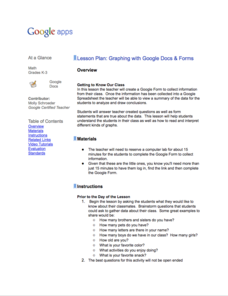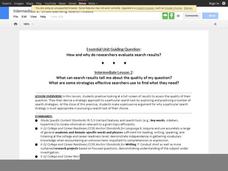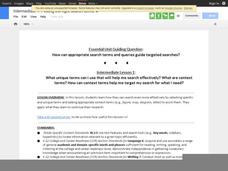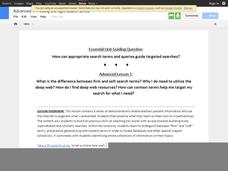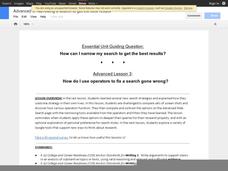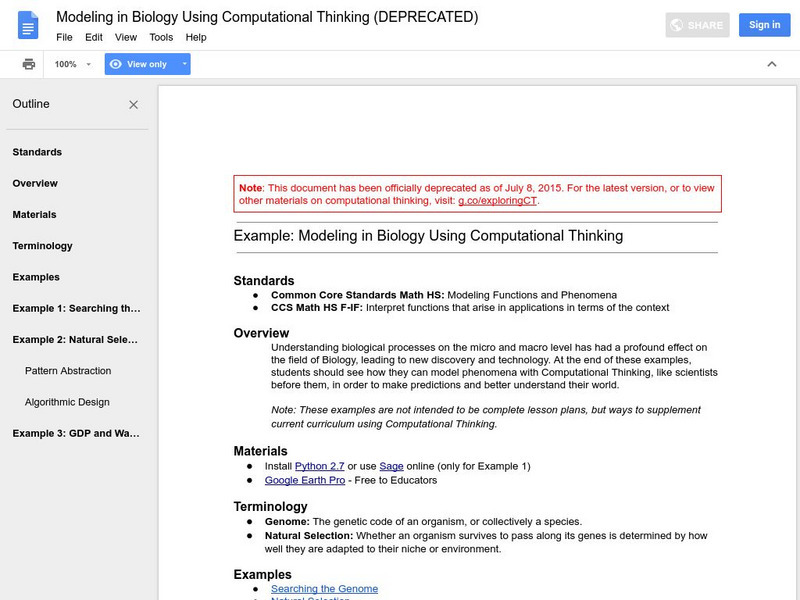Google
Futuristic Communication Project
Conversations around the fire, smoke signals, drums. Books, letters, newspapers. Telegraph, radio, television. Telephones, cell phones, the Internet, Twitter, Pinterest. These developments in communication devices, which we take for...
Google
Graphing with Google Docs & Forms
Get to know your class and teach about data analysis all with the help of Google Docs. Using student-generated questions, create a class survey using Google Forms. Reserve time in the computer lab for learners to complete the form and,...
Google
Beginner 3: Narrowing a Search to Get the Best Results
Uncover new or more relevant information with the filtering tools in the top navigation bar. First, show your class the tools and demonstrate how to use a few. Next, give class members some time to apply what they have learned. They can...
Google
Intermediate 2: Understanding Search Results
Teach your class some strategies for effective searching. Pupils should assess the whole results screen and then determine how to go forward with their searches. A table of strategies is included, as is a challenge. After they complete...
Google
Beginner 2: Understanding Search Results
Once you've entered effective search terms, how do you evaluate the results of your search? Through the presentation and activities included here, pupils will examine results pages and determine what guiding information is provided. By...
Google
Intermediate 4: Searching for Evidence for Research Tasks
Online resources take many forms: blogs, search engines, news websites, documents, wikis. In order to conduct effective research, pupils should become familiar with different formats so that they can more easily choose suitable sites for...
Google
Beginner 4: Searching for Evidence for Research Tasks
Having a strong searching skill set can make a research project much easier and much for successful for pupils. Tackle finding evidence with the ideas included here. The ultimate goal is for class members to learn the stepping stones...
Google
Intermediate 3: Narrowing a Search to Get the Best Results
Examine advanced filters and operators in depth. Class members try out even more filtering tools than they did in the beginning lesson and practice with operators, special symbols or words that affect search results, recognized by...
Google
Beginner & Intermediate 5: Evaluating Credibility of Sources
Convey how to determine appropriate and credible online sources with a series of three lessons. After completing the lessons, class members will know what kinds of sources to use, how to identify credible sources, and how tone and style...
Google
Intermediate 1: Picking the Right Search Terms
A search can be strengthened by unique terms. With the activities and presentation included here, show your class how to target their searches with unique terms and context terms. They can then practice their search skills with...
Google
Advanced 5: Evaluating Credibility of Sources
How do discerning readers determine bias and credibility? Ask small groups to figure it out! First, each group is provided with either articles or videos that contain bias. They examine the resources, respond to included questions, and...
Google
Advanced 4: Searching for Evidence for Research Tasks
Research was very different in the past. Pupils once had difficulty finding sufficient information, but now they have the opposite problem. Show your class how to pick the best resources out of the millions of sites an online search will...
Google
Advanced 2: Understanding Search Results
Effective researchers use a variety of techniques to find what they need online. Pupils who complete the activities listed here should already have an arsenal of strategies for searching. They will learn about and practice two new...
Google
Advanced 1: Picking the Right Search Terms
Many people, when searching online, will type in what they are looking for without much thought. But what's the next step, if they don't get the desired results? Careful selection of search terms. Your class can develop a sense for...
Google
Advanced 3: Narrowing a Search to Get the Best Results
Familiarize your class with Google operators, specific symbols, or words they can use to express more clearly to the search tool what they want to find. With the resources included here, they can test their previous knowledge, view...
Google
Surveys and Estimating Large Quantities
Looking for an estimation activity a bit more involved than the typical "guess the number of jellybeans in the jar" game? Here, learners use a picture to estimate the number of people at a large event, look for potential problems with...
Google
The Law of Large Numbers and Probability
Learners investigate why theoretical probability doesn't always match reality. The activity involves using Python 2.7 (or Sage) to set up a Bernoulli Trial. It also involves setting up a spreadsheet to simulate the Birthday Paradox....
Google
Google Translate
Not sure how to translate a word, phrase, or paragraph? No worries. Simply paste in, type, or dictate your text, select the initial and desired language, and up pops your translation. Better yet, the app will read the text to you in most...
Google
Plate Tectonics Questions
Investigating plate tectonics, boundaries, and the earth's physical attributes is the focus of this short answer, tectonic plates worksheet.
Google
Midpoint and Distance Foldable
Support young mathematicians with learning the concepts of midpoint and distance with this foldable resource. Offering both graphic examples and written equations, this reference clearly demonstrates for students how these key terms...
Google
Discover Buried Treasure
Did you know that you can use Google Book Search to find a particular book or books on a particular subject? The template, provided by Google, lists the three steps researchers can follow to use keywords to search, browse, and locate a...
Google
Google Science Fair
Google's own version of the Science Fair is a global online science and technology competition open to individuals and teams from ages 13 to 18.
Google
Google: Moon
An exciting new way to explore the Apollo moon missions, visit the moon on this interactive map and take a tour of each Apollo landing.
Google
Google for Education: Modeling the Genome Using Computational Thinking
Some example problems where students model biological phenomena with computational thinking in order to make predictions and better understand their world.



